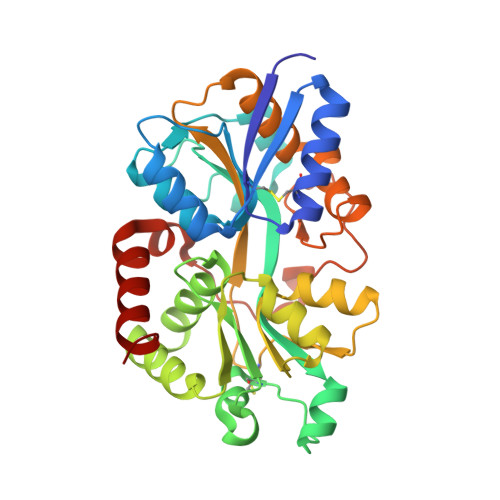Active Transport of Phosphorylated Carbohydrates Promotes Intestinal Colonization and Transmission of a Bacterial Pathogen.
Sit, B., Crowley, S.M., Bhullar, K., Lai, C.C., Tang, C., Hooda, Y., Calmettes, C., Khambati, H., Ma, C., Brumell, J.H., Schryvers, A.B., Vallance, B.A., Moraes, T.F.(2015) PLoS Pathog 11: e1005107-e1005107
- PubMed: 26295949
- DOI: https://doi.org/10.1371/journal.ppat.1005107
- Primary Citation of Related Structures:
4R72, 4R73, 4R74, 4R75 - PubMed Abstract:
Efficient acquisition of extracellular nutrients is essential for bacterial pathogenesis, however the identities and mechanisms for transport of many of these substrates remain unclear. Here, we investigate the predicted iron-binding transporter AfuABC and its role in bacterial pathogenesis in vivo. By crystallographic, biophysical and in vivo approaches, we show that AfuABC is in fact a cyclic hexose/heptose-phosphate transporter with high selectivity and specificity for a set of ubiquitous metabolites (glucose-6-phosphate, fructose-6-phosphate and sedoheptulose-7-phosphate). AfuABC is conserved across a wide range of bacterial genera, including the enteric pathogens EHEC O157:H7 and its murine-specific relative Citrobacter rodentium, where it lies adjacent to genes implicated in sugar sensing and acquisition. C. rodentium ΔafuA was significantly impaired in an in vivo murine competitive assay as well as its ability to transmit infection from an afflicted to a naïve murine host. Sugar-phosphates were present in normal and infected intestinal mucus and stool samples, indicating that these metabolites are available within the intestinal lumen for enteric bacteria to import during infection. Our study shows that AfuABC-dependent uptake of sugar-phosphates plays a critical role during enteric bacterial infection and uncovers previously unrecognized roles for these metabolites as important contributors to successful pathogenesis.
Organizational Affiliation:
Department of Biochemistry, University of Toronto, Toronto, Ontario, Canada.


















